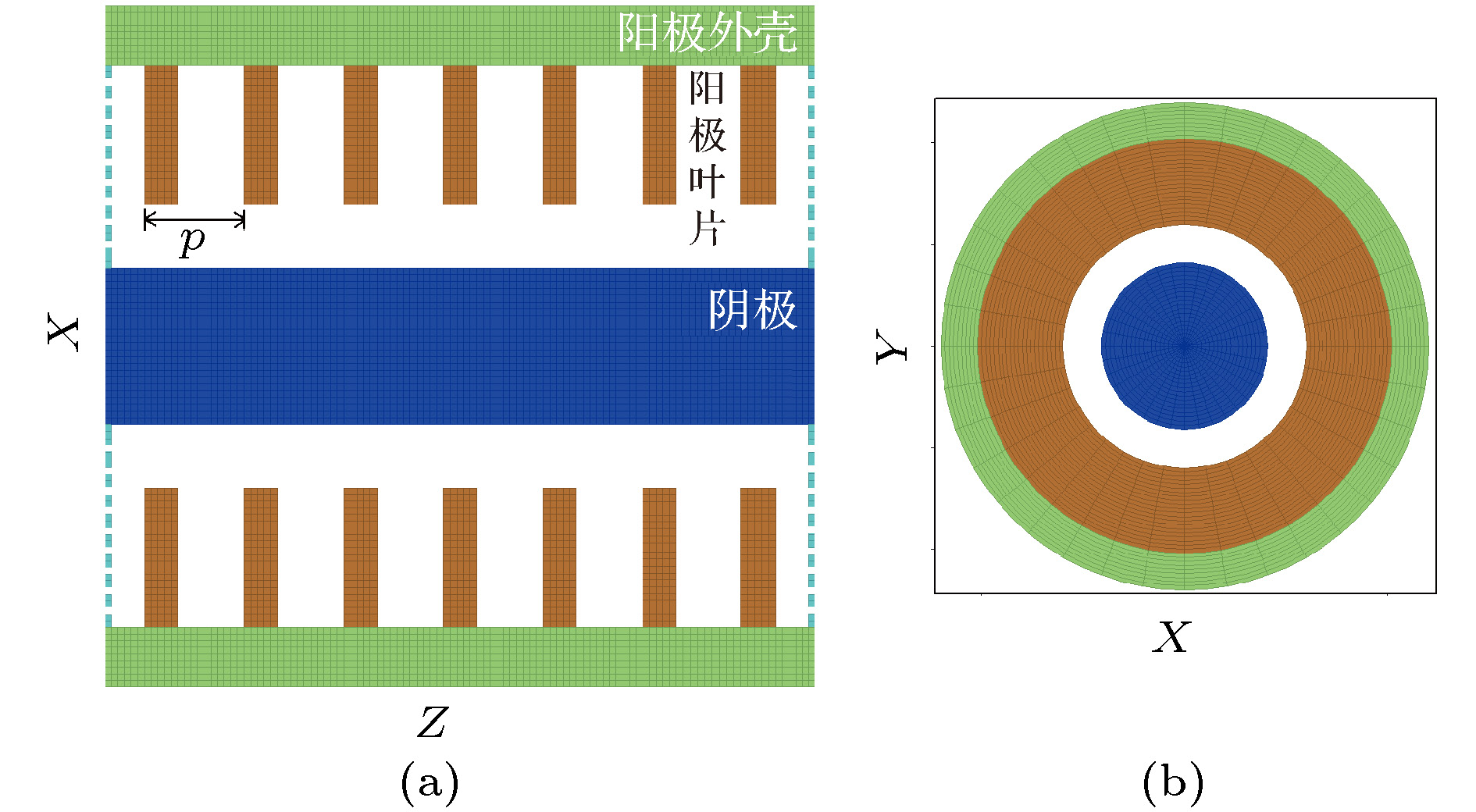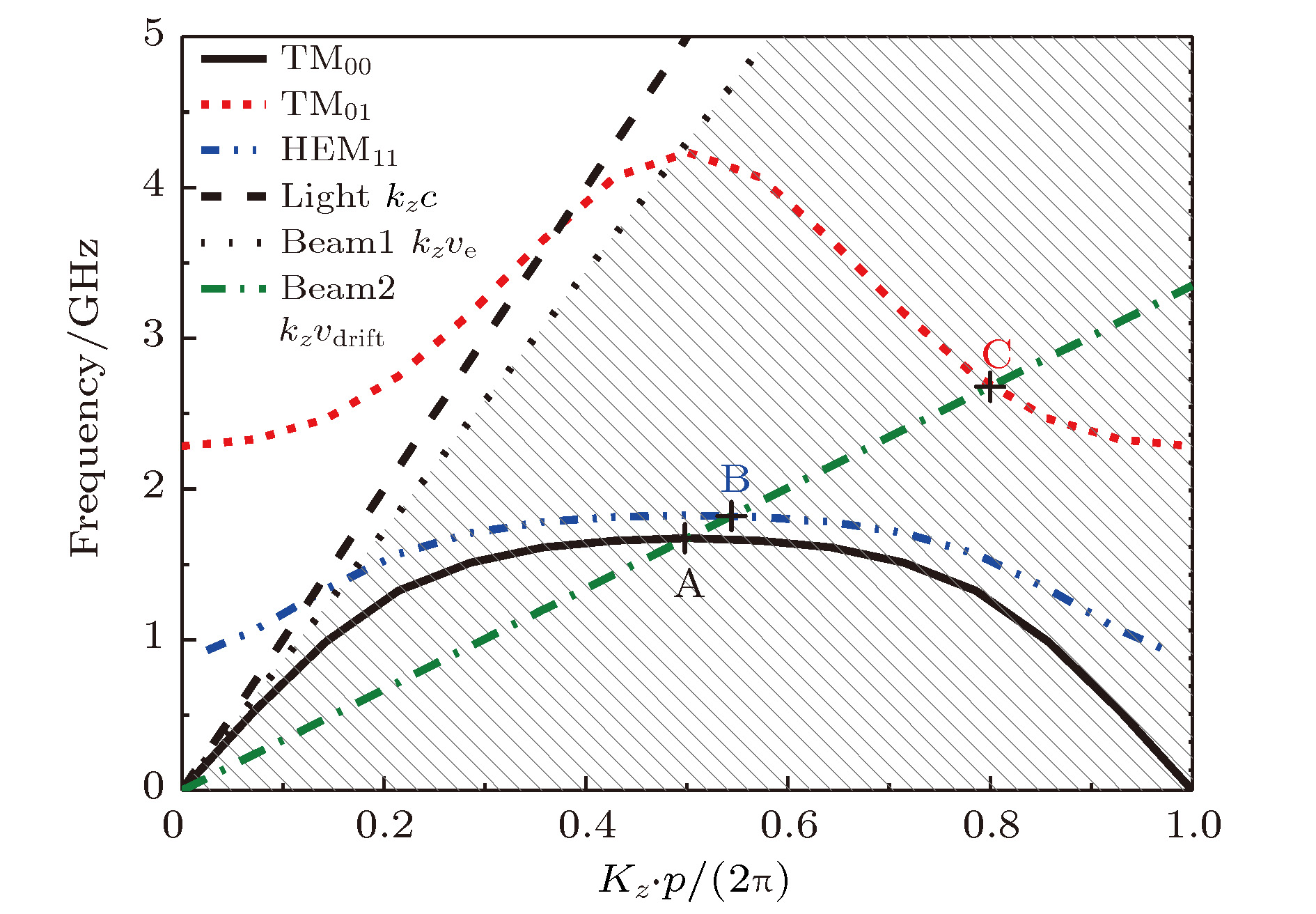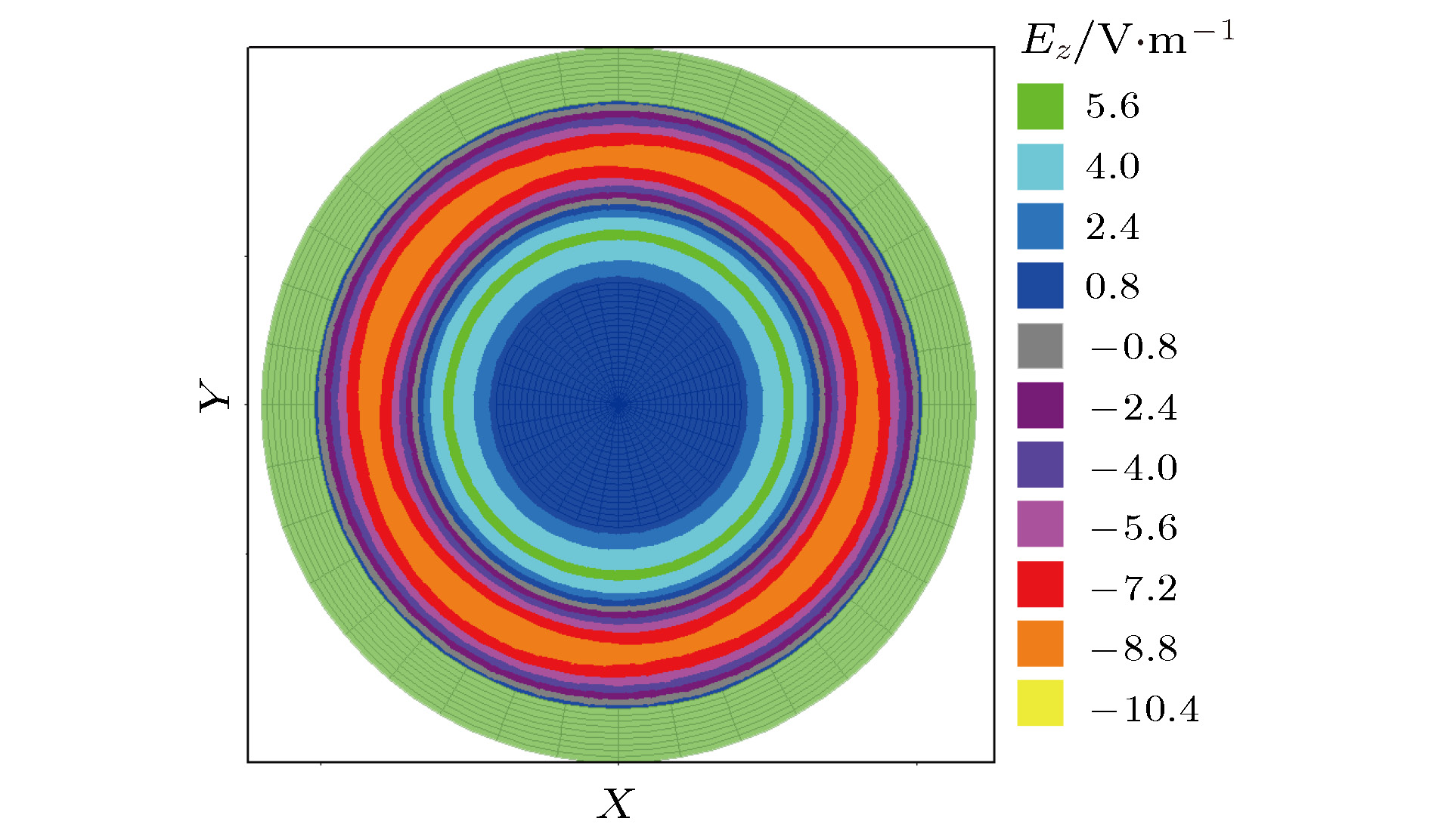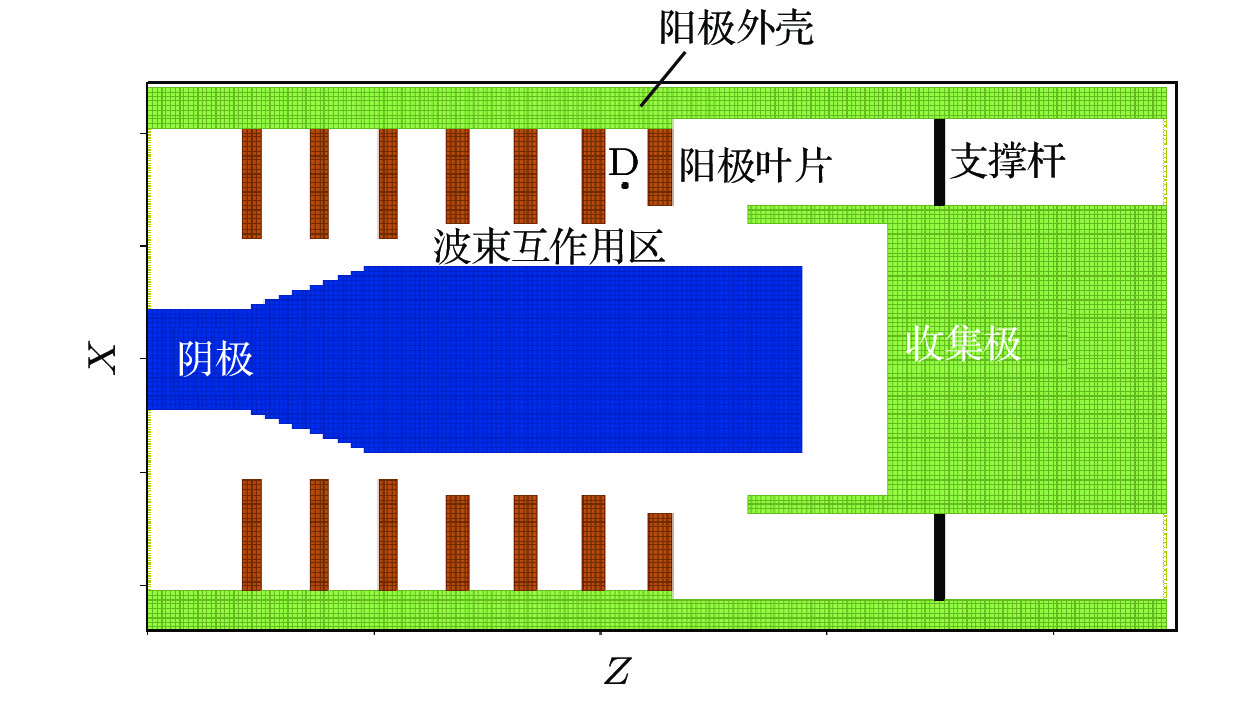-
As a compact and high power microwave source, the competitions among various modes are prone to appear in the initial stage of the development of the radiated electromagnetic field in a magnetically insulated transmission line oscillator (MILO). If the mode competitions are not controlled effectively, the output characteristics of the MILO may decline in the end. As is well known, the operating mode of MILO is generally designed on the π mode of the TM00 mode and the coaxial disk-loaded waveguide is usually adopted as a slow-wave structure for beam-wave interaction in MILO. Therefore from the dispersion relations between the electron beam and the lower order electromagnetic modes(including TM00, TM01 and HEM11 modes) in the slow-wave structure, the characteristics and possible suppression methods of the three kinds of mode competitions are analyzed simply. The first kind mode competition is between the different axial modes of the fundamental TM00 mode. In this case, the electromagnetic field of the competition mode is also axially symmetric and its frequency is slightly lower than that of the π mode. The second is the competition between the TM00 and higher order TM01 mode. In this case, the competition frequency is rather higher than that of the π mode (TM00). The third is the competitions between the TM00 and low order asymmetric HEM11 modes. In this case, the competition frequency is slightly higher than that of the main mode. Appropriately choosing the radii of the anode vanes, the number of the anode cavity and the load length of the cathode, the corresponding mode competition intensity can be weakened. Based on the obtained results above and the existing model of the MILO, a compact high output power L-band MILO is proposed. Numerical studies of the mode competitions and output characteristics are carried by using the three dimensional particle-in-cell code. Cold-cavity test shows that in the low frequency range, the easily stimulated electromagnetic modes are the π mode of TM00 and HEM11 modes with frequencies of 1.61 GHz and 1.77 GHz, respectively. The numerical results of hot-cavity verify that the competition in the initial stage comes mainly from the asymmetric HEM11 mode due to the fact that there exists the strut in the output region, the Cartesian coordinates are adopted during the simulation, and totally symmetry cannot be guaranteed. In addition, electron beam emission from the cathode is not ideally even. But stable and high output microwave power is obtained in the end in the L-band MILO by being optimized. The output power and efficiency are 8.1 GW and 18% respectively, and the mode purity reaches about 97%. -
Keywords:
- magnetically insulated transmission line oscillator /
- mode competition /
- numerical simulation
[1] Barker R J, Schamiloglu E 2001 High-Power Microwaves Sources and Technologies (New York: Institute of Electrical and Electronic Engineer, Inc.) pp43–53
[2] Eastwood J W, Hawkins K C, Hook M P 1998 IEEE Trans. Plasma Sci. 26 698
 Google Scholar
Google Scholar
[3] Lemke R W, Calico S E, Clark M C 1997 IEEE Trans. Plasma Sci. 25 364
 Google Scholar
Google Scholar
[4] Yang W Y 2008 IEEE Trans. Plasma Sci. 36 2801
 Google Scholar
Google Scholar
[5] Fan Y W, Li S R, Wang X Y, Li A K, Yu Y Q, Liu Z Y 2019 Rev. Sci. Instrum. 90 044704
 Google Scholar
Google Scholar
[6] 董志伟, 孙会芳, 杨郁林, 杨温渊, 周前红, 张芳, 董烨 2016 强激光与粒子束 28 033023
 Google Scholar
Google Scholar
Dong Z W, Sun H F, Yang Y L, Yang W Y, Zhou Q H, Zhang F, Dong Y 2016 High Pow. Las. Part. Beam. 28 033023
 Google Scholar
Google Scholar
[7] Wang X Y, Fan Y W, Shu T, Li A K, Yu Y Q, Liu Z Y 2019 IEEE Trans. Plasma Sci. 47 3974
 Google Scholar
Google Scholar
[8] Nallasamy V, Datta S K, Reddy S U, Jain P K 2017 J. Electromagn. Waves Appl. 31 1864
 Google Scholar
Google Scholar
[9] Kumar A, Dwivedi S, Jain P K 2019 IEEE Trans. Plasma Sci. 47 4642
 Google Scholar
Google Scholar
[10] Kim D H, Jung H C, Min S H, Shin S H, Rhee M J, Park G S, Kim C H, Yim D W 2006 7th IEEE International Vacuum Electronics Conference (IVEC)/6th IEEE International Vacuum Electron Sources Conference (IVESC) Monterey, CA, April 25–27, 2006 p352
[11] Dixit G, Kumar A, Jain P K 2017 Phys. Plasma. 24 013113
 Google Scholar
Google Scholar
[12] Nallasamy V, Narasimhamurthy C, Geetha B, Gupta S K, Datta S K, Reddy S U, Jain P K 2017 J. Electromagn. Waves Appl. 31 375
 Google Scholar
Google Scholar
[13] Qin F, Wang D, Xu S, Zhang Y, Fan Z K 2016 Rev. Sci. Instrum. 87 044703
 Google Scholar
Google Scholar
[14] 孙会芳, 董志伟, 杨郁林 2010 强激光与粒子束 22 303
 Google Scholar
Google Scholar
Sun H F, Dong Z W, Yang Y L 2010 High Pow. Las. Part. Beam. 22 303
 Google Scholar
Google Scholar
[15] Kim D H, Jung H C, Min S H, Shin S H, Park G S 2007 Appl. Phys. Lett. 90 124103
 Google Scholar
Google Scholar
[16] Lemke R W 1989 J. Appl. Phys. 66 1089
 Google Scholar
Google Scholar
[17] Cousin R, Larour J, Gardelle J, Cassany B, Modin P, Gouard P, Raymond P 2007 IEEE Trans. Plasma Sci. 35 1467
 Google Scholar
Google Scholar
[18] Cousin R, Larour J, Gouard P, Raymond P 2006 J. Appl. Phys. 100 084512
 Google Scholar
Google Scholar
[19] 王冬, 陈代兵, 范植开, 邓景康 2008 57 4875
 Google Scholar
Google Scholar
Wang D, Chen D B, Fan Z K, Deng J K 2008 Acta Phys. Sin. 57 4875
 Google Scholar
Google Scholar
[20] Jiang T, Zhang J D, He J T, Li Z Q, Ling J P 2016 IEEE Trans. Plasma Sci. 44 755
 Google Scholar
Google Scholar
[21] 秦奋, 王冬, 陈代兵, 文杰 2012 61 094101
 Google Scholar
Google Scholar
Qin F, Wang D, Chen D B, Wen J 2012 Acta Phys. Sin. 61 094101
 Google Scholar
Google Scholar
[22] 董烨, 董志伟, 杨温渊, 周海京 2009 强激光与粒子束 21 1199
Dong Y, Dong Z W, Yang W Y, Zhou H J 2009 High Pow. Las. Part. Beam. 21 1199
[23] 姜利辉, 李浩, 吴泽威 2014 强激光与粒子束 26 063009
 Google Scholar
Google Scholar
Jiang L H, Li H, Wu Z W 2014 High Pow. Las. Part. Beam. 26 063009
 Google Scholar
Google Scholar
-
-
[1] Barker R J, Schamiloglu E 2001 High-Power Microwaves Sources and Technologies (New York: Institute of Electrical and Electronic Engineer, Inc.) pp43–53
[2] Eastwood J W, Hawkins K C, Hook M P 1998 IEEE Trans. Plasma Sci. 26 698
 Google Scholar
Google Scholar
[3] Lemke R W, Calico S E, Clark M C 1997 IEEE Trans. Plasma Sci. 25 364
 Google Scholar
Google Scholar
[4] Yang W Y 2008 IEEE Trans. Plasma Sci. 36 2801
 Google Scholar
Google Scholar
[5] Fan Y W, Li S R, Wang X Y, Li A K, Yu Y Q, Liu Z Y 2019 Rev. Sci. Instrum. 90 044704
 Google Scholar
Google Scholar
[6] 董志伟, 孙会芳, 杨郁林, 杨温渊, 周前红, 张芳, 董烨 2016 强激光与粒子束 28 033023
 Google Scholar
Google Scholar
Dong Z W, Sun H F, Yang Y L, Yang W Y, Zhou Q H, Zhang F, Dong Y 2016 High Pow. Las. Part. Beam. 28 033023
 Google Scholar
Google Scholar
[7] Wang X Y, Fan Y W, Shu T, Li A K, Yu Y Q, Liu Z Y 2019 IEEE Trans. Plasma Sci. 47 3974
 Google Scholar
Google Scholar
[8] Nallasamy V, Datta S K, Reddy S U, Jain P K 2017 J. Electromagn. Waves Appl. 31 1864
 Google Scholar
Google Scholar
[9] Kumar A, Dwivedi S, Jain P K 2019 IEEE Trans. Plasma Sci. 47 4642
 Google Scholar
Google Scholar
[10] Kim D H, Jung H C, Min S H, Shin S H, Rhee M J, Park G S, Kim C H, Yim D W 2006 7th IEEE International Vacuum Electronics Conference (IVEC)/6th IEEE International Vacuum Electron Sources Conference (IVESC) Monterey, CA, April 25–27, 2006 p352
[11] Dixit G, Kumar A, Jain P K 2017 Phys. Plasma. 24 013113
 Google Scholar
Google Scholar
[12] Nallasamy V, Narasimhamurthy C, Geetha B, Gupta S K, Datta S K, Reddy S U, Jain P K 2017 J. Electromagn. Waves Appl. 31 375
 Google Scholar
Google Scholar
[13] Qin F, Wang D, Xu S, Zhang Y, Fan Z K 2016 Rev. Sci. Instrum. 87 044703
 Google Scholar
Google Scholar
[14] 孙会芳, 董志伟, 杨郁林 2010 强激光与粒子束 22 303
 Google Scholar
Google Scholar
Sun H F, Dong Z W, Yang Y L 2010 High Pow. Las. Part. Beam. 22 303
 Google Scholar
Google Scholar
[15] Kim D H, Jung H C, Min S H, Shin S H, Park G S 2007 Appl. Phys. Lett. 90 124103
 Google Scholar
Google Scholar
[16] Lemke R W 1989 J. Appl. Phys. 66 1089
 Google Scholar
Google Scholar
[17] Cousin R, Larour J, Gardelle J, Cassany B, Modin P, Gouard P, Raymond P 2007 IEEE Trans. Plasma Sci. 35 1467
 Google Scholar
Google Scholar
[18] Cousin R, Larour J, Gouard P, Raymond P 2006 J. Appl. Phys. 100 084512
 Google Scholar
Google Scholar
[19] 王冬, 陈代兵, 范植开, 邓景康 2008 57 4875
 Google Scholar
Google Scholar
Wang D, Chen D B, Fan Z K, Deng J K 2008 Acta Phys. Sin. 57 4875
 Google Scholar
Google Scholar
[20] Jiang T, Zhang J D, He J T, Li Z Q, Ling J P 2016 IEEE Trans. Plasma Sci. 44 755
 Google Scholar
Google Scholar
[21] 秦奋, 王冬, 陈代兵, 文杰 2012 61 094101
 Google Scholar
Google Scholar
Qin F, Wang D, Chen D B, Wen J 2012 Acta Phys. Sin. 61 094101
 Google Scholar
Google Scholar
[22] 董烨, 董志伟, 杨温渊, 周海京 2009 强激光与粒子束 21 1199
Dong Y, Dong Z W, Yang W Y, Zhou H J 2009 High Pow. Las. Part. Beam. 21 1199
[23] 姜利辉, 李浩, 吴泽威 2014 强激光与粒子束 26 063009
 Google Scholar
Google Scholar
Jiang L H, Li H, Wu Z W 2014 High Pow. Las. Part. Beam. 26 063009
 Google Scholar
Google Scholar
Catalog
Metrics
- Abstract views: 7464
- PDF Downloads: 59
- Cited By: 0















 DownLoad:
DownLoad:














